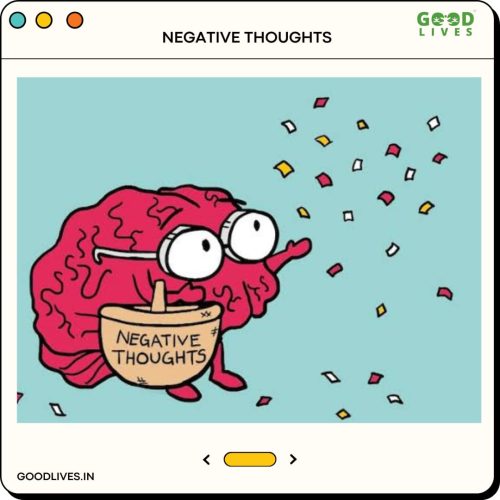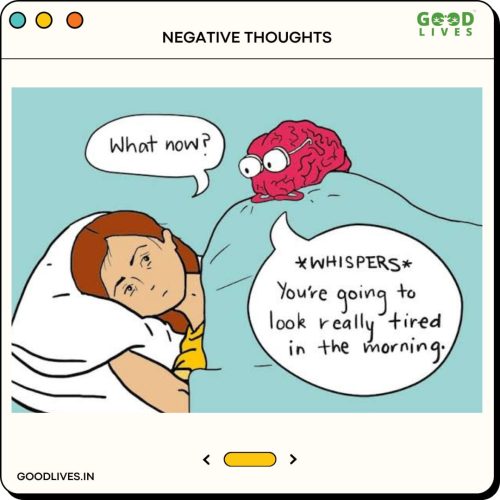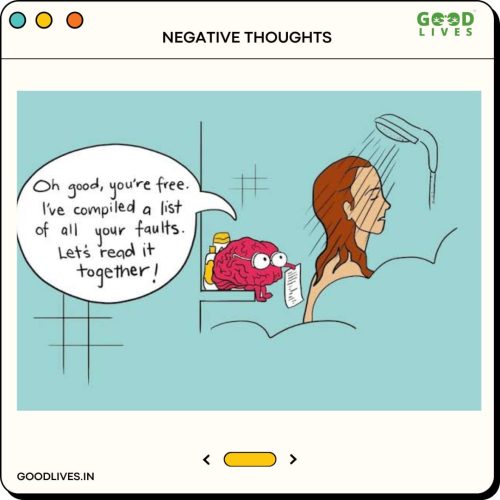What is the Meaning of Negative Thinking?

“A negative thought can never give you a positive result”
Having negative thoughts and emotions which instead of boosting your morale, makes you dwell into underconfidence- is the major effect of negative thinking. Negative self-talk is an inner dialogue you have with yourself that could result in limiting your capability to believe in yourself and your own abilities and to reach your full potential.
What are the Causes of Negative Thinking/ What can Cause Such Thoughts to Occur?

What are the Effects of these Discouraging Thoughts?

Gloomy outlooks contribute to low self-worth and insecurities. It makes you feel as if you’re not effective in the world. Psychologists link negative thinking to depression, anxiety, chronic worry, and obsessive-compulsive disorder (OCD) as well. This evil has a great impact on the human brain too as researchers have inquired that negative thinking could increase the risk of dementia.
Top 10 Types and Examples of Negative Thoughts

1. Overgeneralization
- Taking one negative event or detail about a situation and making it a universal pattern makes it true about your whole life.
- For example “I have received such low marks in my physics test, I can’t do anything right!”
2. Labeling
- It is when you put a negative criticism on yourself or someone else denying you of seeing what truly is behind that tag of yours.
- “I am not good at either academics or sports, I am such a loser” or “I didn’t have anything to say in that conversation. I’m totally uninteresting!
3. Emotional reasoning
- This negative thinking disorder is when you have a belief in something and presume it to be a true fact.
- For example, having a sense of loneliness and absurdly concluding it to the thought of ” No one wants to be with me because I am lonely”.
4. Fortune telling
- Predicting that every situation would turn out negatively deprives you of enjoying the moment, and increases the chances of that event ending on a bad note.
- Like thinking “If I ask that person for help they’ll deny it, and I will be embarrassed!” “I don’t wanna go to the part it will end up being boring and reckless”.
5. Overlooking the positive
- Taking any positive aspect of your day and pondering about it is immoral and it minimizes the positive aspect to its least. It discounts any evidence against our negative view of ourselves or our situation.
- For example, I did well on that one quiz, but I just got lucky.
6. Predicting minds
- A negative thinking pattern where you tend to assume what the other person could be thinking- concerning you- presuming it to be a poor comment.
- “I don’t think this person is paying attention to what I am saying, she does not even care!”
For booking a session, here’s where you search ends Mental Health Services
7. Catastrophizing
- Have you ever thought “If I do not get into this college I will die of embarrassment”?
- Then you might be suffering from catastrophizing types of negative self-talk. It is when you take a problem and blow it out of proportion.
8. Mental filter
- Focusing only on the one negative while camouflaging the other hundreds of positives.
- For example, focusing on that one negative comment when the teacher has left you many more improvements and bless full comments.
9. Personalization
- This kind of negative thought includes a sense of blaming yourself in every situation. Felling a need to make everything about you- in a negative way.
- Having thought of “The time I got tripped over, everyone would be laughing at me for that. I know”.
10. Imperatives
- Pondering on what is expected by you while using terms such as “shoulds” and “musts”.
- For example “I shouldn’t feel anxious while giving a presentation in front of the class”.
“Once you replace your negative thoughts with positive ones, you’ll regain your faith in this colorful magnificent world”
How to Stop Bad Thoughts in your Head? What can be Done to Avoid or End these Useless Negative Notions?
For replacing your bad emotions with good ones first, you need to know how you feel. It is tested that sometimes you don’t even know if you are sinking into a black hole. An easy way to identify your negative thoughts is to-wherever placing an opinion or judgment about any notion-, take a moment and think, does it make you decline towards sadness, negativity, or misery? After all, these are your emotions, they should be used in power by you, not against you!
Here are some ways to make yourself feel better:
“The greatest enemies of success and happiness are negative emotions of all kinds.”
– Gretchen Rubin
- They are “just” thoughts! Do not make them facts: Whenever having negative self-talk, remember, that picturing some unfavorable images does not make them true! The purpose of thoughts is to make your eyes satisfied by what you see, hence by the human ability you form your own opinions. Telling yourself positive reviews is the way to go about it. Filling your self-created negativity inside of you is just like digging one’s own grave.
- Focus on what you are feeling right now: If you’re sad, feel the sadness. But don’t let yourself think that you are always going to feel that way. These sad emotions pass away until you dint linger on them making them your reality.
- Do something nice for yourself: Find happiness in the little things or you could find something that makes you laugh
- Sleep well. Eat well. Be active: The kinder you are to your body, the easier it is to feel more positive about yourself.
- Take time to count your blessings: There are so many things for each of us to be grateful for. What’s one thing you appreciate?
- Become a little social: This is just a fancy way of saying “create the kind of community you want.” Enjoy some time with family and friends. Find a faith community that works for you. Join a team or club. Take up a new hobby.
The lists of negative thoughts won’t matter once you understand what Negative affectivity is. And Negative thinking disorder therapy enables you to work upon controlling your unfavorable emotions and finding happiness in little things.
Do you know what online counseling actually means and how it works?
0 Comments